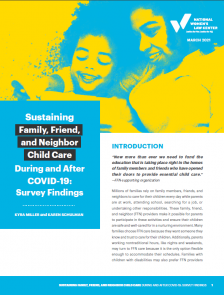Abortion rights, women of color, and LGBTQIA+ people are under attack. Pledge to join us in fighting for gender justice.
 Millions of families rely on family members, friends, and neighbors to care of their children every day while parents are at work, attending school, searching for a job, or undertaking other responsibilities. While family, friend, and neighbor (FFN) care has long been a crucial piece of the child care system, the pandemic has only further illustrated its necessity and strengths—as well as its vulnerability. Many FFN child care providers continued – or started – to provide care during the pandemic, or cared for more children – such as school-age siblings of young children who had been in their care or children from additional families. Yet many others stopped providing care out of health and safety concerns for themselves, their own families, the children in their care, and the children’s families. Those FFN providers that continued offering care often struggled to obtain the supports and resources they need to ensure the safety and well-being of themselves and the children in their care. This report summarizes the findings of NWLC’s survey of FFN providers and organizations that support these providers, conducted between late July and early September 2020, to offer insight into how the pandemic, the recession, and access to supports have affected FFN caregivers’ ability to provide care, and what strategies will help these crucial providers thrive in the future.
Millions of families rely on family members, friends, and neighbors to care of their children every day while parents are at work, attending school, searching for a job, or undertaking other responsibilities. While family, friend, and neighbor (FFN) care has long been a crucial piece of the child care system, the pandemic has only further illustrated its necessity and strengths—as well as its vulnerability. Many FFN child care providers continued – or started – to provide care during the pandemic, or cared for more children – such as school-age siblings of young children who had been in their care or children from additional families. Yet many others stopped providing care out of health and safety concerns for themselves, their own families, the children in their care, and the children’s families. Those FFN providers that continued offering care often struggled to obtain the supports and resources they need to ensure the safety and well-being of themselves and the children in their care. This report summarizes the findings of NWLC’s survey of FFN providers and organizations that support these providers, conducted between late July and early September 2020, to offer insight into how the pandemic, the recession, and access to supports have affected FFN caregivers’ ability to provide care, and what strategies will help these crucial providers thrive in the future.
